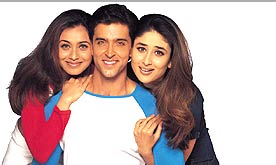|
|
  
|
       
|
|
HOME |
MOVIES The renaissance of the smaller budget movies Small budget movies are in vogue again. Quickly created and at reasonable budgets most of them have recouped their investments at the box office easily. While critics may rave about the better storyline and greater entertainment value of successful small budget films like Raaz, Style, Yeh Dil Aashiqana, cynics say it is because these films had their budgets on the right side of the balance sheet. "There is a paradigm shift happening. Earlier films were made slowly. They depended heavily on dates from the stars, which tended to be spaced over a period of time. So films took 12 to 18 months from concept to finish. Now you have new productions houses and younger directors who want to make quality films on shorter time schedules and budget," says Subhabrata Mazumder, an analyst with Motilal Oswal Securities. The long gestation period for films earlier meant a mounting financial burden for medium sized producers who borrow money at interest rates between four and eight percent per month. All this with no guarantee of success at the box-office. Caught between the devil and the deep sea, filmmakers and production houses are opting to have the economics on their side. Created within six to seven months, with a fairly low key star cast and a tight rein on the budget, these films have a greater shot at leveling the books than expensive extravaganzas. "If you look at the film production industry today, you will see that it is divided into two parts. One is the old club with people like Subhash Ghai, Yash Chopra and such big names who are continuing to create films with big star cast and long gestation period. The other is the newer director and production houses like Metalight (Dil Vil Pyar Vyar) and RGV Productions (Pyaar Tune Kya Kiya, Road, Company), iDreams (Mitr, Monsoon Wedding, 16th December) who make small budget films within six months," says Mazumder. There are many old timers too who now swear that quicker production schedules and smaller budgets are the future of the industry. Veterans like Mahesh Bhatt and N Chandra have crossed over to this model. In 1988, Chandra created his blockbuster Tezaab on a budget of Rs 10 million. He then produced various big budget movies like Narasimha and Shikari, all of which were duds at the counters. So he went back to the board and churned out a movie called Style that was produced on a budget of Rs 2 crores. While Tezaab took 15 months to make, Style was done within three months and released December last year. The tight rein on costs and schedule paid off. Style, with its cast of complete unknowns, was declared an above average earner all over India. Chandra has since sworn to make small and quick films. "Budget is going to be very important to me from now on. If the budget is not going to work, the film is not going to work. The bottomline is that this is business like any," he says. Chandra has his detractors. They are the band of dream merchants for whom cinema is about creating a larger than life spectacle and that vision can be incompatible with small budgets. "Big films are cinema's future. They bring a film alive on screen. They are what will attract people to come to the theatres to watch them. Reducing budgets is not an easy thing. You have to do whatever is necessary. What is important is the way the film is made. If it is a bad film then even a small budget can't save it," says Jain. For moneybags like Jain or Ghai a flop here or there does not hurt too much. Ghai's production company, Mukta Arts, is estimated to be sitting on a war chest of Rs 90 crores raised from its foray into the stock markets. But for smaller filmmakers, lower budgets is the only way to play against the Goliaths. "The cost of production has skyrocketed and you cannot cover the same today from presales. In the case of a small budget film, one can take the risk of marketing the film all by himself," says Shyam Shroff, managing director, Shringar films. Films made on a small scale don't always do well. A case in point is the recently released Gunaah, starring Bipasha Basu and Dino Morea was a flop at the box office but industry insiders say that the producers did not lose any money because of the small budget. "Gunaah didn't cost too much to make. So the producers recovered their money. It might not have been a superhit like Raaz but at least they didn't lose money on it," says an industry source. An informal poll of a few industry veterans pegs the ideal budget for a movie today at around Rs 50 million to Rs 70 million and a production schedule of six months. "If you stick to these numbers, there is a fair chance that you will recover the money even if the film is not a huge success at the counters," says a filmmaker. But Shroff whose company has distributed many small films like Snip and Ek Chotisi Love Story is categorical that there will be always be place for "movies of all shapes and budgets depending upon the skills of the individuals concerned." "Having more small budget movies is not a solution. The solution is good content, well told, and it could then be of any budget. It is not necessary that all small films would be a hit and all big films a flop," says Shroff. The more passionate argue that it difficult to slot movies based on the budget. After all, films are magical. You can't distill their essence to fit into accounting books. "Every year there will be small movies but they will coexist will bigger budget films. The success of recent small budget films doesn't invalidate the space that big films will have. But in the end, it is not budget that counts. It is the content that matters. Budget is a problem only if your content is not good," says Nahta. But that doesn't stop Chandra from declaring that he will never produce any big star cast films. It is a matter of survival for him. "I was 16 when I joined films. I don't know any other business but this. I know the every aspect of film making like the palm of the mind. I have to make films to survive and making quality small films is the only way." |
       
|
|
|
||
|
Channels: News: Shopping: Services: |
Astrology | Auto | Contests | E-cards | Food | Health | Home & Decor | Jobs | Lifestyle | Matrimonial Money | Movies | Net Guide | Product Watch | Romance | Tech.Edu | Technology | Teenstation | Travel | Women News | Cricket | Sports | NewsLinks Shopping | Books | Music Personal Homepages | Free Email | Free Messenger | Chat |
|
|
| ||
|
(c) 2002 rediff.com India Limited. All Rights Reserved. |
||